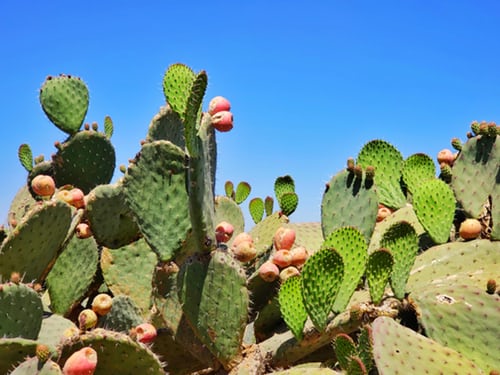A new plant-based leather has been created from the ‘prickly cactus’.
Mexican entrepreneurs Adrián López Velarde and Marte Cázarez have recently launched their eco-friendly material ‘Desserto’.
Wanting to create a cruelty-free and sustainable alternative to leather, the pair have made the new material from nopal- a species of cactus that is native to southern America and Mexico.
The material is partially biodegradable and can last up to 10 years.
In an interview with Live Kindly, Velarde stated “The idea of using this raw material was conceived because this plant does not need any water to grow, and there is plenty of it throughout the Mexican Republic.”
This is not the first time a plant-sourced alternative to leather has been released. Piñatex- a material created from the fibres of pineapple leaves was released in the 1990s.
Related content:
Real leather is typically made of cow-skin and is usually a by-product of the meat and dairy industry. The overall process of creating real leather is often ridiculed for its long and chemically rife impact on the environment.
Desserto for its unique and eco-friendly approach to material production. Vegan First have commended Verlarde and Cázarez, labelling their product as ‘highly sustainable’.
Many have also taken to Twitter to express their excitement
i found a sustainable brand in Mexico that makes vegan leather bags out of nopales 🥺 I want them allll
— Ԁ$∀ (@anaswagprincess) November 25, 2019
A pair of young inventors from Mexico will unveil the very first organic leather made entirely from the nopal—or prickly-pear cactus this week—offering a sustainable, stylish, and eco-friendly alternative to leather. https://t.co/AUCteQcC39
— Jane Hinchliffe 💚🌿🖖 (@crazyjane125) December 11, 2019
Whilst overall a positive reaction has been received, many disagree that Desserto is as ethically sourced as it claims.
Bronwyn Lowenthal, owner of sustainable fashion boutique Lowie explains that many of these technological made leathers are actually more harmful to the environment. “The thing about these new tech-made fibres is that they’ve actually gone through a lengthy process to get to the finished product. Think of all the carbon emissions”.
Lowenthal commits herself to only using natural fibres, which includes leather. “I use traditional fibres and techniques which can be used in a modern way”. This includes using a vegetable-based turning process in comparison to a chemically and artificial one.
What do you think of the rise of new tech-materials?
Let us know your thoughts @voiceoflondon_UK.
How does everyone feel about ‘tech-made’ leather? ✨
— Voice Of London UK (@VoiceOfLondonUK) December 14, 2019
Words by Peri Taskiran
Featured image by Unsplash

